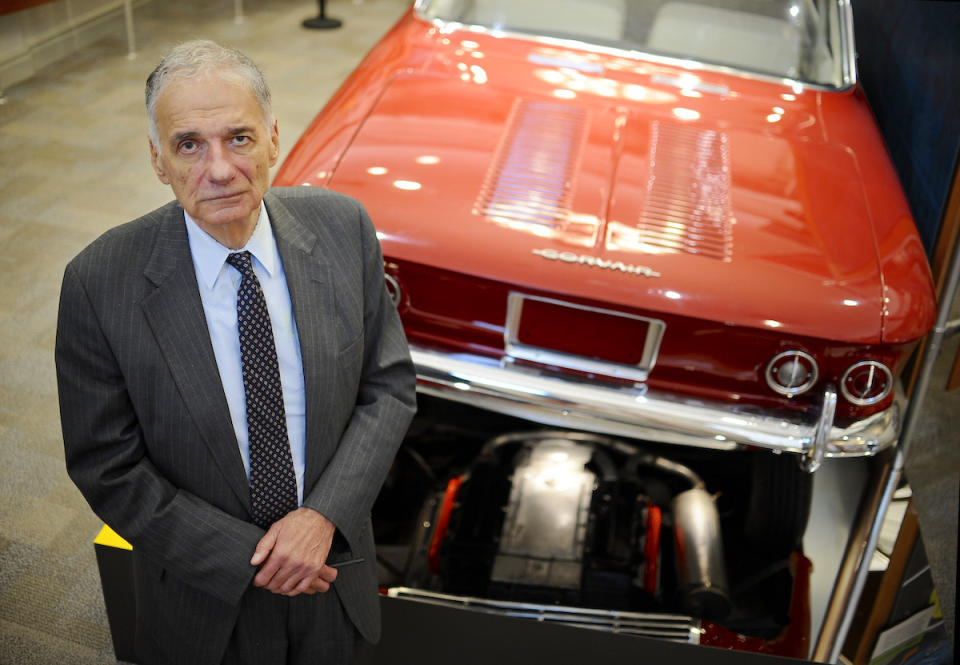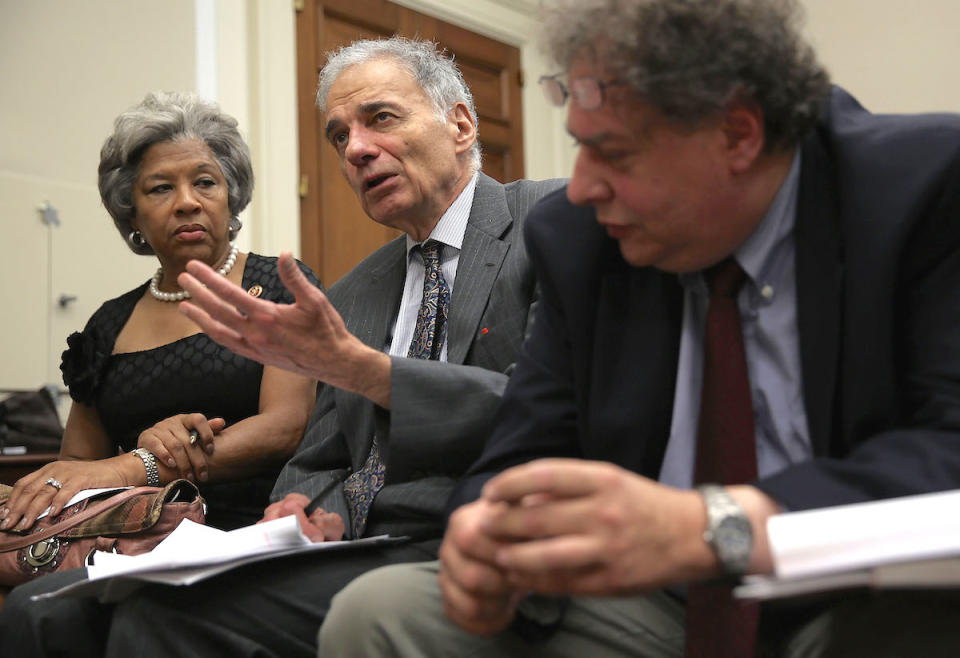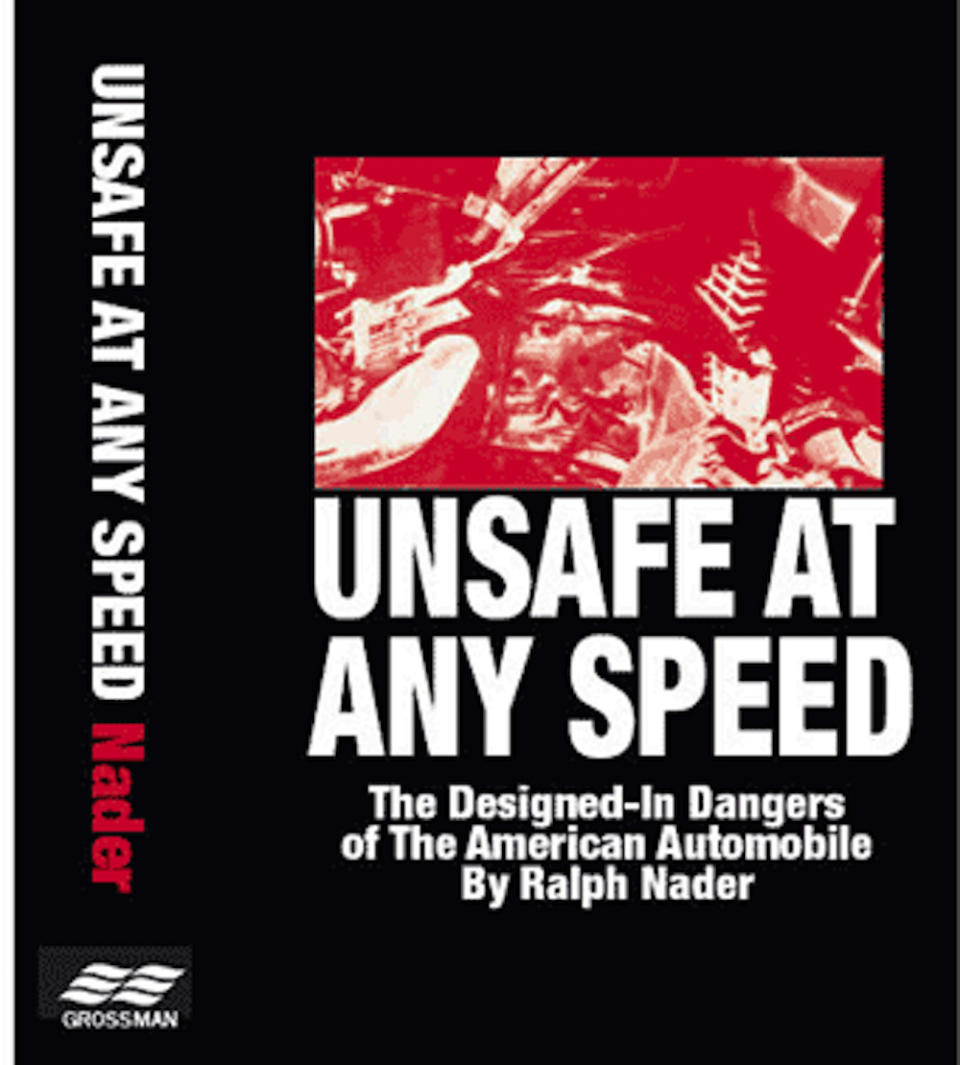Ralph Nader: 50 Years After “Unsafe,” Automakers Have Lost Their Way

It was the book that launched a thousand regulations—and saved hundreds of thousands, if not millions, of lives.
“Unsafe at Any Speed: The Designed-In Dangers of the American Automobile” by Ralph Nader recently turned 50 years old, and its author remains in the spotlight holding businesses and the federal government feet to the proverbial fire.
“It’s a book that is still relevant today,” Nader told Yahoo Autos.
While Nader’s book’s title is often tied to the demise of the Chevrolet Corvair, a rear-engine, air-cooled compact car, the book was truly an indictment of the entire industry. Nader included chapters on the lack of foresight in designing America’s highways, severe pollution concerns from automobiles, lack of safety devices such as seat belts in many cars, and how designers, engineers and automotive executives did not seem concerned. The last chapter of Unsafe discussed the impending battle safety advocates faced, and how if nothing changed, one out of two Americans would be injured or killed in a car accident.
The book is a data-filled masterpiece of its time that vaulted Nader into career of questioning motives behind policy and practice for two generations. “Unsafe” dispelled the once famous comment by a General Motors executive, proving, instead, what was good for Americans was not always good for GM.
As the decades since show, the auto industry should be happy that Nader published his book when he did, pushing for safety items that all of the carmakers were forced to eventually adopt, potentially saving them millions of dollars in future lawsuits. In 1980, 23 people out of 100,000 died annually in car crashes. Today, thanks to the safety revolution started by Nader, the rate is 10 per 100,000.
“It saved them from a lot of disasters,” Nader said. “They didn’t have good brakes, radial tires, roof crush standards, seat belts.”

“A good thing too far”
While the auto industry has adapted through the years, Nader said, the industry has “lost its way again.”
“The auto industry wants to turn the car into an office or a theater,” Nader said. “They are enamored with Silicon Valley but there are big problems with computerized cars,” he said. “Leave it to the auto industry to take a good thing too far.”
Last week, the National Safety Council released data saying that more than 38,000 people died last year in U.S. traffic accidents, an 8 percent jump over 2014, the largest year over year increase since Nader’s book came out 50 years ago.
Cheap gas, an improving economy and other factors certainly play a role in the increase in accidents, but so do carmakers creating vehicles that offer so many distractions such as complex infotainment systems.
“I think all of the studies show that multitasking is dangerous,” he said. “It delays the amount time to hit the brakes.”
“The car is not an office, it is not a theater, it is a car. One that needs people to take control of the wheel, and people to build them right the first time.”
As for the current state of the automotive industry, which Nader follows closely, he said, people have become obsessed with autonomous vehicles, which he says will not hit American highways any time soon.
“This hype by Google and others that we’ll have autonomous cars in 10 years,” Nader said, “is ridiculous.”
Insurance companies maybe the ultimate arbiter of bad news for self-driving cars, said Nader, adding that the current trend of vehicles arriving strip power away from dealers, mechanics and other independent businesses associated with cars. The real losers are the consumers.

NHTSA has become a political entity, not a safety one
More importantly, Nader says, the auto industry and politicians have helped turn the National Highway Traffic Safety Administration into a political organization instead of a safety one. Through the years, NHTSA has been starved of money, leaving it inefficient, understaffed and impotent to the barrage of new products being created.
“There was 65 million recalls in the past few years,” Nader said, “(it) didn’t have the staff. NHTSA is going the wrong way.”
Instead, consumers have to rely on universities and other organizations to spot serious problems with vehicles—as with the Volkswagen diesel recalls, uncovered by independent researchers, or the GM ignition cases, revealed by trial attorneys.
“Regulatory inaction is not news, and it should be,” he said. “Now with the recalls, (the media are) racing for Pulitzers.”
As for what comes next within the automotive world, Nader said he sees continued turbulence. Cars will remain a primary mode of transportation but will evolve with the potential to become something like personalized mass transportation working as trains.
“I think a lot of auto companies don’t know what the future will bring,” he said. Sales will likely decline and there will be struggles with both technology as well as new competitors.
“It’s gotten very complicated the last few years,” Nader said.
But complicated won’t deter Nader from investigating and exposing shortfalls in any industry. Nothing can stop that.

Want an autographed copy 50th Anniversary Edition of “Unsafe at Any Speed,” go to Nader.org. Books are on sale for $100
Also, check out these excerpts from the documentary “Unreasonable Man.”

